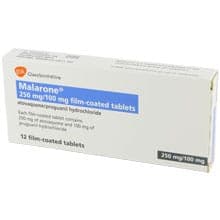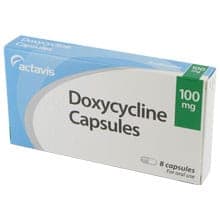Login to your account
- Prescription included
- Genuine medication
- All-inclusive service - No hidden fees
- Free next-day delivery
Malaria
Buy malaria tablets online before you travel
Malaria is considered one of the most dangerous diseases in the world, infecting nearly 250 million people every year.
If you are planning to travel to any country with a malaria risk, it is very important to protect yourself from the disease.
Malaria tablets (known as antimalarials) are the safest way to prevent yourself from catching malaria. Keep reading to find out more about the disease, including symptoms, how it spreads, and prevention.
Available Treatment(s)

- Clinically-proven to prevent and treat malaria
- Taken for less time than other antimalarials
- Great alternative for chloroquine-resistant areas

- Effectively prevents and treats malaria
- Once daily tablet
- Great alternative for chloroquine-resistant areas
What is Malaria?
Malaria is a serious disease that is caused by a parasite. Mosquitoes can carry these parasites and if they bite people, they can infect them with malaria.
You might feel ill just days after being bitten by an infected mosquito, or your symptoms might show up as late as one year after.
If left untreated, malaria can be fatal. Before travelling, you should take steps to prevent catching it.
You should also make sure to know the symptoms so you can recognise when to get medical attention.
Where am I most at risk?
Malaria can only be caught in certain parts of the world. High-risk areas include:
- Sub-Saharan Africa
- Central and South America
- South-East Asia
- Dominican Republic and Haiti
- India
- Parts of the Middle East

You are more likely to catch malaria during nighttime because it is too hot in the day for mosquitoes to be active.
Because mosquitoes like to breed near water, malaria is spread mostly during the wet season. The insects need to take more blood from humans to feed their young.
How is malaria spread?
The vast majority of malaria is spread by female mosquitoes carrying the malaria parasite.
It cannot be spread from human to human, unless a pregnant woman becomes infected and passes the infection onto her unborn baby.
The disease could also be spread through blood, such as by the sharing of needles.
The malaria cycle
Below is a diagram showing the cycle of how malaria is spread from mosquitoes to humans.

- A female mosquito will bite an infected human, and start carrying the parasite
- The parasite is then passed on to the next human the mosquito bites
- Once in the bloodstream, the parasite travels to the liver and multiplies
- It then spreads to the red blood cells, and can then be picked up by the next mosquito that bites
- This mosquito will then start to infect other people, spreading the disease further
Infected mosquitoes can infect multiple different humans per day. This cycle causes malaria to spread to many people very quickly.
What are the different types of malaria parasite?
Four kinds of malaria parasites can harm humans. Some types are more dangerous than others.
- Plasmodium falciparum: This is the deadliest form of malaria parasite. It is most commonly found in Africa, accounting for 99.7% of malaria cases in the continent.
- Plasmodium vivax: Mostly found in South America and Asia, this parasite is the second most dangerous. Symptoms might only show months or even a year after becoming infected with p. vivax.
- Plasmodium ovale: This parasite is only found in Western Africa. It is considerably less dangerous than p. falciparum, and symptoms might also show up months after getting infected.
- Plasmodium malariae: This parasite can be found in many parts of the world, including Africa, South America, and Asia. It is a relatively mild form of malaria.

Another type of parasite (called Plasmodium knowlesi) can be spread to certain animals, which can then be spread to humans.
What are the symptoms of malaria?
Malaria symptoms are often mistaken for the flu, which can delay getting a diagnosis and the right treatment.

If you have returned from any country with a malaria risk within the past year, watch out for the following symptoms:
|
|
If you think you could have malaria, you must get checked by a healthcare professional as soon as possible.
The most aggressive form of parasite can escalate from mild symptoms to organ failure, coma, and even death, within less than 24 hours.
How do I prevent malaria?
Malaria prevention is necessary before and during your travels. It is much easier to prevent malaria than it is to treat it.
The best way to prevent malaria is to take medication and avoid getting bitten.
Malaria tablets
There are several different malaria tablets (called antimalarials) that prevent malaria. In general, these have to be taken daily for a few days or weeks before you travel, as well as throughout your stay.
| Active ingredient | Available doses | Suitable for travel to: | Available at euroClinix? | |
|---|---|---|---|---|
| Doxycycline | Doxycycline hyclate | 100mg | All areas with a risk of malaria | ✔ Click here |
| Malarone | Proguanil Hydrochlorid/ Atovaquone | 100mg/250mg | All areas with a risk of malaria | ✔ Click here |
| Mefloquine | Mefloquine hydrochloride | 250mg | Any region except for Southeast Asia | ❌ |
| Paludrine/Avloclor | Chloroquine Phosphate/ Proguanil Hydrochloride | 100mg/200mg | India, the Middle East and South America | ❌ |
| Primaquine | Primaquine phosphate | 30mg | Most areas with a risk of malaria | ❌ |
Antimalarials are only available with a doctor’s prescription. Always follow the dose and course provided by a healthcare professional.
Avoiding bites
As well as taking antimalarials, you should take extra steps to avoid getting mosquito bites.

This way, you give yourself the best chance of preventing infection.
How is malaria treated?
If you do catch malaria, you will likely be treated in a hospital. The treatment you are given will depend on the parasite type, and how bad your infection is.
To reach your blood cells as quickly as possible, the treatment will be given to you intravenously (meaning that it will go directly into your veins).
With the correct medication, the malaria parasite can be completely cleared from your body, curing you of the disease.
Doxycycline and Malarone can be used to treat malaria when combined with other medicines.
Can I buy malaria tablets online?
You can buy antimalarial tablets online at euroClinix. We offer both Malarone and Doxycycline for the prevention of malaria.
Simply select your chosen treatment and you will be guided through an online consultation form. This will shortly be assessed by one of our UK doctors.
Once approved, the medication will be sent to your door with free next-day delivery.
This ensures you have enough time to start taking antimalarials before you travel.
Select
medicationFill out a short
medical formDoctor issues
prescriptionMedication sent
from pharmacy
